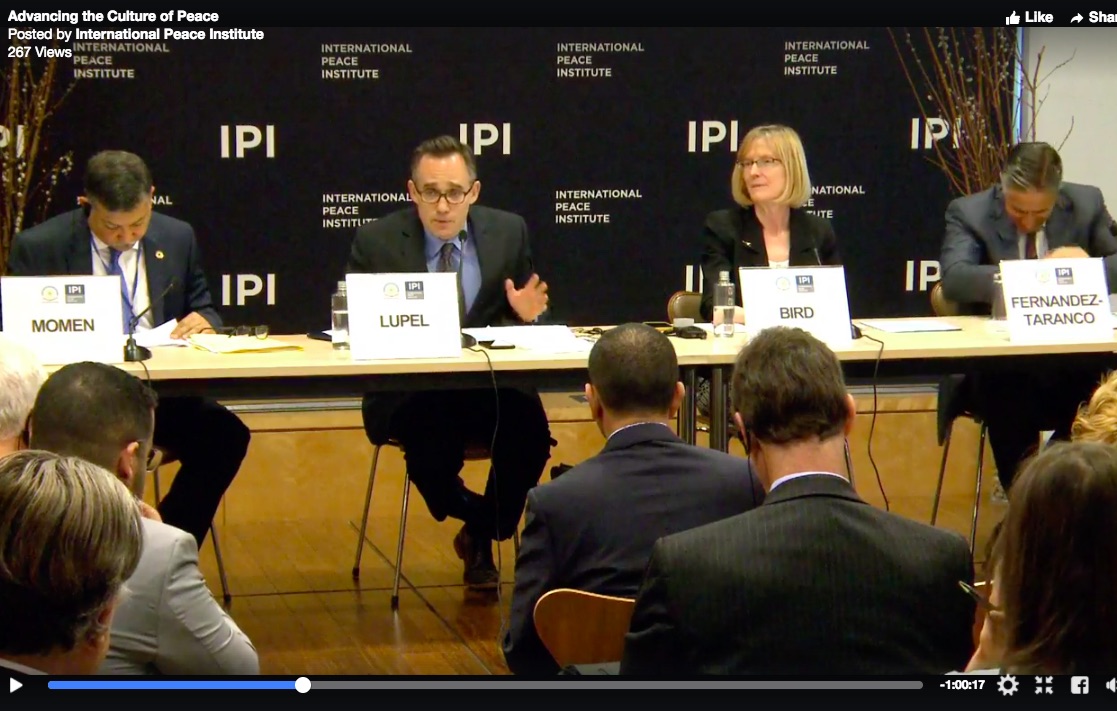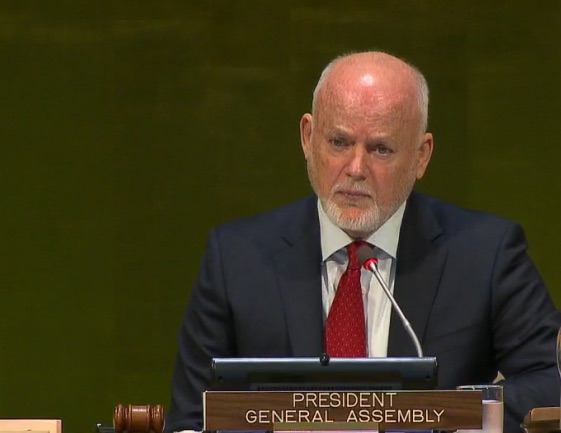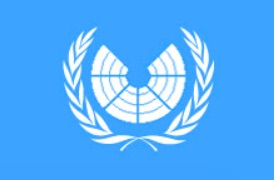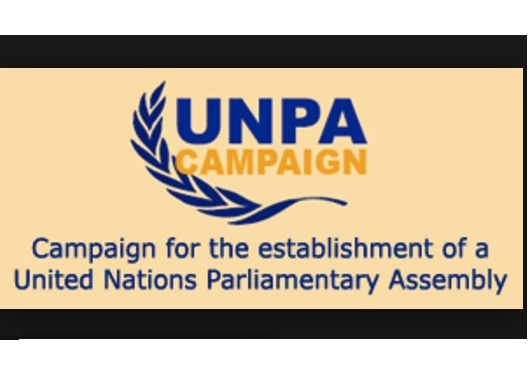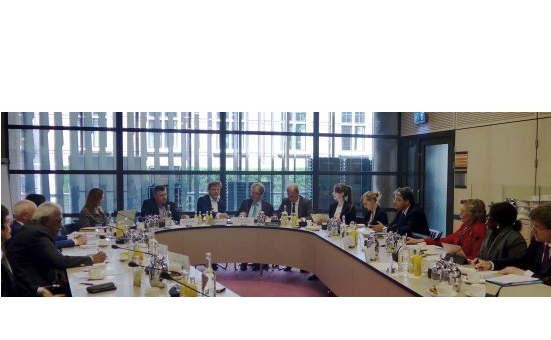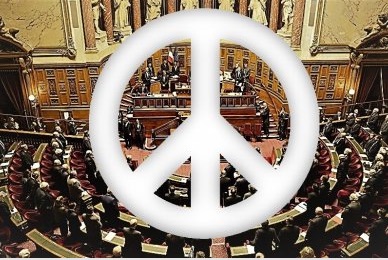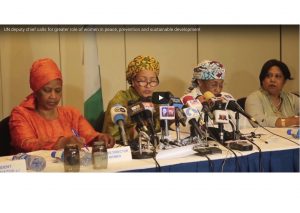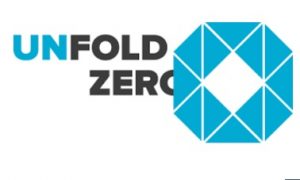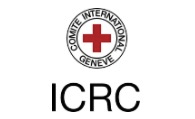. TOLERANCE & SOLIDARITY .
An article by Joan Erakit from the International Press Syndicate
There is a famous bible passage that alludes to the unfortunate kinship between siblings; a child is questioned by God about his brother and he, at the time having killed his brother, denies allegiance by asking: “Am I my brothers keeper?” Some may interpret the parable about Cain and Able as follows: being humans, we are brothers by birth meant to look out for one another, yet circumstances have arisen that have turned us against each other. In the end, it is religion that is called upon to solidify bonds, bringing people from various backgrounds and points of view, together on the same page.
Religion, an often complex topic within political arenas, found its way to the United Nations Headquarters in New York for a political panel around the role of religious leaders in the peace building process in the Middle East.
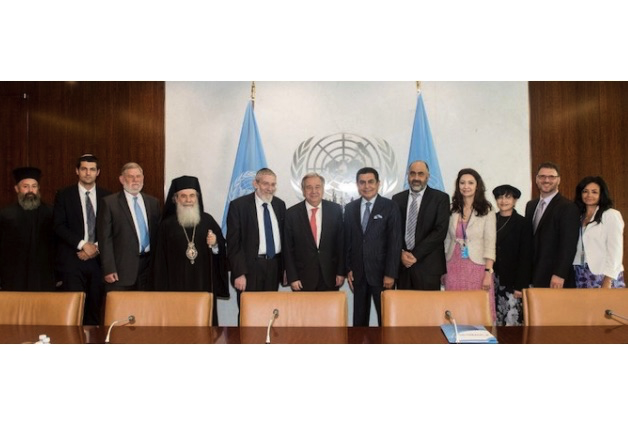
Photo: Religious Leaders from Israel and Palestine pose with UN Secretary-General António Guterres (6th from left) and UNAOC High Representative Nassir Abdulaziz Al-Nasser (6th from right). Credit UN Photo
(Click on photo to enlarge)
With the support of the government of Spain, represented by the Minister of Foreign Affairs and Cooperation Alfonso Maria Dastis, and the United Nations Alliance of Civilizations (UNAOC), led by High Representative Nassir Abdulaziz Al-Nasser, religious leaders from Israel and Palestine converged on July 18 at the UN to defend and demand their seat at the peace building table, emphasizing the need for the UN to formally acknowledge that religion could no longer be kept out of the Israeli-Palestinian conflict.
Representatives of the three monolithic faiths in the region – Christianity, Islam and Judaism — attended the meeting in New York, and in a show of support, the UN Secretary-General António Guterres joined the discussion.
He delivered his remarks to a packed room that also consisted of the esteemed panelists: Sheikh Raed Badir, member of the Palestinian Ulama Council; Patriarch Theophilos III of Jerusalem, Patriarch of the Holy City of Jerusalem and all Palestine, Syria and beyond the Jordan River; Dr. Adina Bar Shalem, founder and president of the Haredi College in Jerusalem, Rabbi Avraham Giesser, Rabbi of Ofra and Council Head for the State religious educational system of Israel and finally, Rabbi Michael Melchoir, the community Rabbi of Jerusalem and president of the Mosaica Religious Peace Initiative.
Unfortunately, due to unforeseen circumstances, one of the panelists, Sheik Imad Abed Al-Hamid Al-Falouji, chairman of the Adam Center for Dialogue of Civilizations in Palestine and a collaborator of Rabbi Melchoir, could not obtain a visa to the U.S. and thus joined the discussion via videoconference.
“The Holy Land has a special place in the hearts of billions of people around the world,” Guterres said, later adding, “With every passing day, frustration grows, hope diminishes, and the perspective of a peaceful resolution of the Israeli-Palestinian conflict seems more distant.”
The Secretary-General’s words were well received given that the speakers gathered had spent time together in Spain for the Alicante Declaration, a summit for religious peace in the Middle East hosted by the Spanish government and UNAOC in November of 2016.
The Declaration itself was devised as proof that religious leaders from all three monolithic faiths had agreed to partner and become responsible for creating a peaceful existence among their followers, more specifically stating:
“We vehemently call for the cessation of incitement, misrepresentation and distortion of the image of the other and of the neighbor. We commit ourselves to educate future generations to uphold mutual respect. Drawing upon the religious traditions, and our understanding of what is best for our communities and peoples, we call for a solution that recognizes the right of the two peoples to exist with dignity.”
(Article continued in right column)
Question related to this article:
How can different faiths work together for understanding and harmony?
(Article continued from left column)
It cannot be denied that the Israeli-Palestinian conflict has troubled the Middle East and thus the entire world, for years and that various initiatives have been undertaken by groups and individuals on both sides to mediate a solution – almost always failing.
At the same time, it cannot be denied that religion, at its core, has the power to influence people. “We firmly believe that Religion is not the source of the problem. On the contrary, religion can be part of the solution,” according to Al Nasser.
Thus in an effort to offer a new avenue for which to broker mediation, UNAOC has approached the situation differently by working with religious leaders on both sides of the conflict in hopes of securing them a seat at the peace building table.
“The Alliance is one of the UN’s main leading entities promoting interfaith and intercultural dialogue. We recognized that peace cannot be in attained through the endeavors of politicians alone. For this reason, we value the partnership and engagement of various players such the civil society, the private sector, the academia and most of all, the Religious Leaders and faith-based organizations,” Al-Nasser said.
Given that religious leaders are there to provide guidance to those who seek its solace and understanding, and because their status in society tends to hold extreme gravitas, it is only fitting that they play an important role in shaping the spiritual journey’s of humanity – especially when it comes to conflict.
Whether it was the passionate words of Al-Falouji, who himself shared in a videoconference his personal experience of working across religious lines or the poetic words of the Patriarch Theophilos who confidently deemed Jerusalem as the common home for Jews, Christian and Muslims – one thing was certain: religion is a political tool, and in this case, one that is seeking to bridge peace between two historically fraught sides.
“As I have continuously stressed, the two-state solution is the only path to ensure that Palestinians and Israelis realize their national and historic aspirations and live in peace, security and dignity. The expansion of illegal settlements, or the violence or the incitement undermine this prospect,” said Guterres.
Speaking with candor, the Secretary-General urged religious leaders in the audience not to dismiss the opportunity for which they had to change the narratives about their respective faiths – narratives that had been distorted by extremism and radicalization. Instead, it was his solemn plea that religious leaders, local and regional might utilize their influence to foster messages of peace, resolution and commonality among congregants.
By appealing to the core values of all three monolithic faiths irrespective of both conflict lines through the Religious Peace Initiative, Guterres believed that a dialogue could at least be started.
In theory, this is a promising desire that would hopefully do just as the Secretary- General hopes. In practice, it will require a concrete action plan that not only holds religious leaders in the region accountable for their declarations, but also provides them with capacity building, tools and spaces to begin these dialogues among their followers.
“We firmly believe that religion is not the source of the problem. On the contrary, religion can part of the solution,” Al-Nasser concluded.
Sitting in the room at the UN Headquarters, one could not help but notice the sense of urgency possessed by the panelists to engage in the peace building process – they were all thoroughly prepared with passionate statements of a life that would see no conflict in the Middle East, “a dream” as Rabbi Melchoir put it.
After a fruitful summit in Spain and a productive meeting at the United Nations, the coalition of religious leaders ready to bring Muslims, Christians and Jews together must prepare to develop not only a cohesive message, but a method of dialogue that speaks to all three faiths and that is felt by men, women and children in such a way that they look upon each other as a brothers keeper, and not his enemy.
